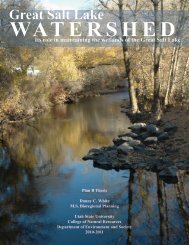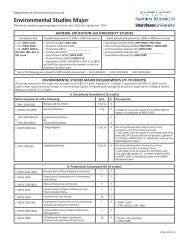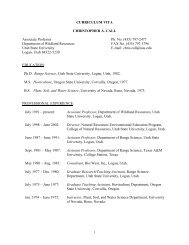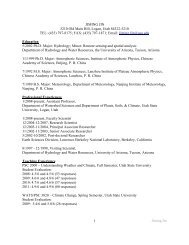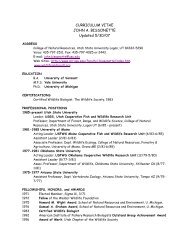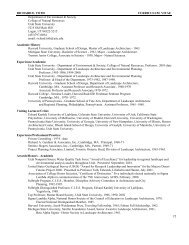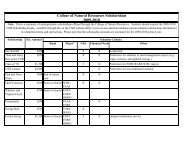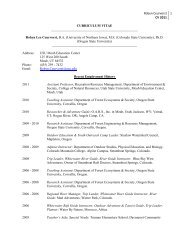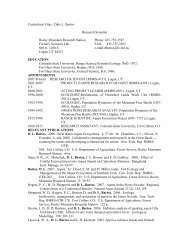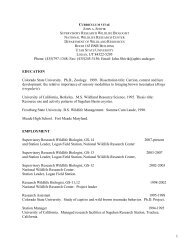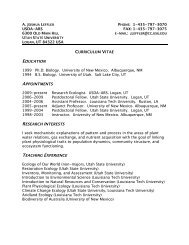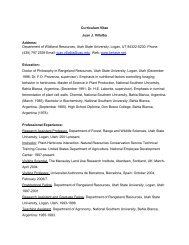University Education in Natural Resources - CNR Home - Utah State ...
University Education in Natural Resources - CNR Home - Utah State ...
University Education in Natural Resources - CNR Home - Utah State ...
You also want an ePaper? Increase the reach of your titles
YUMPU automatically turns print PDFs into web optimized ePapers that Google loves.
144 <strong>Natural</strong> <strong>Resources</strong> and Environmental Issues Volume VII<br />
All people have <strong>in</strong>terests and rights, and they should be<br />
subjects of our moral concern.<br />
It is not so easy for us to agree what other (if any) th<strong>in</strong>gs are<br />
moral subjects and thus deserve moral consideration.<br />
Moral community. Moral agents and moral subjects are often<br />
considered to be members of a moral community. But how<br />
large is that moral community? Besides human be<strong>in</strong>gs, do<br />
other be<strong>in</strong>gs have rights? If so, which be<strong>in</strong>gs? (And what<br />
rights?) Among the most frequent and most violently argued<br />
questions which wildlife biologists, and to a lesser extent<br />
fisheries biologists and foresters, encounter these days are<br />
those over the presumed rights of other be<strong>in</strong>gs, and our<br />
obligations to treat those other be<strong>in</strong>gs as deserv<strong>in</strong>g moral<br />
consideration. How we treat them then is a question of right<br />
and wrong based on their moral stand<strong>in</strong>g; they are moral<br />
subjects.<br />
How do we decide what are proper subjects of moral concern?<br />
One common set of arguments stems from the respects <strong>in</strong><br />
which other be<strong>in</strong>gs resemble human be<strong>in</strong>gs? Are they alive<br />
(do we need to treat rocks and waterfalls with moral concern?)<br />
Do they have “<strong>in</strong>terests,” e.g., to rema<strong>in</strong> alive? Perhaps plants<br />
qualify. Can they feel pa<strong>in</strong>? (Are they “sentient”?) Perhaps<br />
most vertebrate animals would qualify under that standard.<br />
Can they th<strong>in</strong>k? Do they have <strong>in</strong>tellects (e.g., whales,<br />
porpoises, squid)?<br />
Animal-welfare and animal-rights groups such as PETA<br />
(People for the Ethical Treatment of Animals) tend to<br />
concentrate their arguments on mammals and birds. But we<br />
have also heard the emotional discussions about classroom<br />
dissections of frogs and other organisms. I remember very<br />
dist<strong>in</strong>ctly the clear discomfort of a student when an <strong>in</strong>structor<br />
dumped a se<strong>in</strong>e-haul of fish before a class on the shore and<br />
unconcernedly began to lecture while the fish flopped around<br />
on the sand. I have before me as I write a wallet-sized card<br />
with the photo of a round goby, an exotic species rapidly<br />
spread<strong>in</strong>g <strong>in</strong> the Great Lakes region s<strong>in</strong>ce 1990. This<br />
<strong>University</strong> of M<strong>in</strong>nesota Sea Grant card advises fishers to<br />
“Always dump your bait bucket on land, never <strong>in</strong>to the water.”<br />
Are liv<strong>in</strong>g fish moral subjects; are they members of our moral<br />
community? This is, I th<strong>in</strong>k, typical of the difficult questions<br />
that students and professionals <strong>in</strong> natural resources majors<br />
will need to deal with much more frequently than we did <strong>in</strong> the<br />
recent past.<br />
Many people seem to <strong>in</strong>clude all vertebrate animals <strong>in</strong> their<br />
moral community; legal rights are often similarly def<strong>in</strong>ed. For<br />
example, at Cornell <strong>University</strong> “all vertebrate animals used for<br />
teach<strong>in</strong>g, demonstration, or research at Cornell (<strong>in</strong>clud<strong>in</strong>g<br />
cold and warm vertebrates) are subject to protection by both<br />
federal and state laws” (OSP 1997).<br />
Moral extensionism. What we th<strong>in</strong>k of as the moral<br />
community seems to be grow<strong>in</strong>g rapidly larger. Extend<strong>in</strong>g<br />
rights to animals is often called zoocentrism, and to all liv<strong>in</strong>g<br />
th<strong>in</strong>g th<strong>in</strong>gs, biocentrism. Some go further and speak for<br />
ecocentrism, that idea that all of nature has rights, or<br />
alternatively, that we have obligations to all of nature.<br />
This expansion of our moral community was proposed by<br />
Leopold (1949) <strong>in</strong> his discussion of a “land ethic.” By “land”<br />
he meant not only the surface of the earth, but all of the plants<br />
and animals, the ecosystems, the natural processes occurr<strong>in</strong>g<br />
there. Leopold suggested that stages <strong>in</strong> our ethical<br />
development <strong>in</strong>cluded 1) the personal (I must not steal from<br />
you), 2) the relation between an <strong>in</strong>dividual and her community<br />
(I must pay just taxes; I must participate <strong>in</strong> civic activities) and<br />
3) our relationship with the land. Rather than see<strong>in</strong>g land as<br />
only property and entail<strong>in</strong>g no rights or obligations, we need to<br />
see it as a community of which we are a part and which<br />
requires moral consideration. Although Leopold did not<br />
speak much of an <strong>in</strong>ternational community or of the longterm<br />
future, as an ecologist he surely would <strong>in</strong>clude them <strong>in</strong> his<br />
moral community. Astronomer Carl Sagan would extent the<br />
moral community still further: “The cognitive abilities of<br />
chimpanzees force us, I th<strong>in</strong>k, to raise search<strong>in</strong>g questions<br />
about the boundaries of the community of be<strong>in</strong>gs to which<br />
special ethical considerations are due, and can, I hope, help to<br />
extend our ethical perspectives downward through the taxa on<br />
Earth and upwards to extraterrestrial organisms, if they exist”<br />
(Wilson 1997).<br />
Many other concepts could be def<strong>in</strong>ed and discussed here, but<br />
that is the reader’s job. Your primer will be different from<br />
m<strong>in</strong>e, but no doubt we will both <strong>in</strong>clude ideas such as rights,<br />
obligations, autonomy, <strong>in</strong>tr<strong>in</strong>sic value, reverence for life, and<br />
many others.<br />
MORAL DILEMMAS<br />
Moral dilemmas (if they occur at all; some say that there is no<br />
such th<strong>in</strong>g) are situations <strong>in</strong> which there is a conflict between<br />
two right th<strong>in</strong>gs to do, not between a right and a wrong choice.<br />
And the need to choose one action over another results <strong>in</strong> a<br />
morally difficult situation.<br />
Kidder (1995) argues that there are four common types of<br />
moral dilemmas:<br />
1. between truth and loyalty<br />
2. between the <strong>in</strong>dividual and the community<br />
3. between short-term and long-term <strong>in</strong>terests<br />
4. between justice and mercy.<br />
Dilemmas Between Truth and Loyalty<br />
I probably have no moral dilemma when my brother asks me<br />
how I like his new necktie. I can gently break the news to him<br />
with a m<strong>in</strong>imally stated truth. But a critically <strong>in</strong>jured mother<br />
who asks about her baby’s welfare, when the baby has just died




